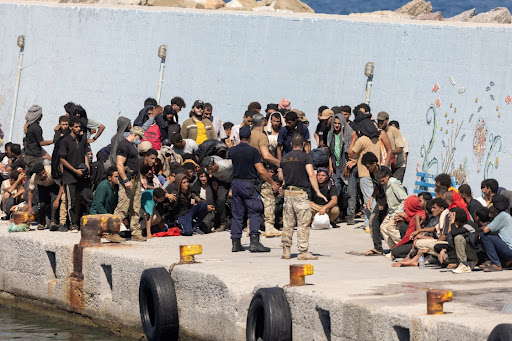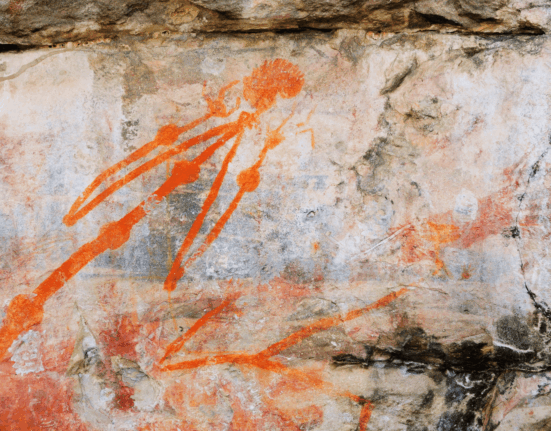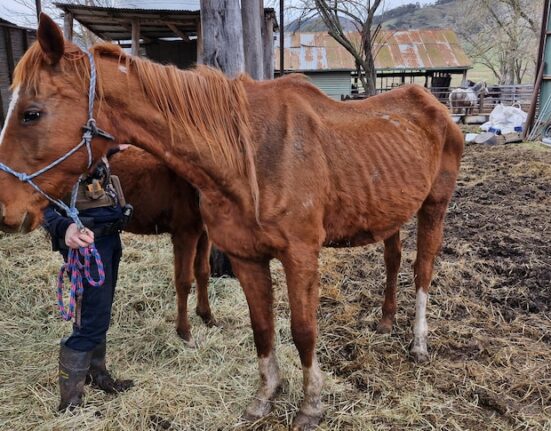Greece, a picturesque land of ancient ruins and azure waters, found itself at the center of a modern-day humanitarian crisis as it embarked on a mission to rescue hundreds of migrants adrift in the Mediterranean. The southern islands of Gavdos and Crete became the backdrop for a series of dramatic rescues by the Greek coastguard, unfolding like scenes from a high-stakes maritime thriller.
In five separate incidents over a harrowing weekend, more than 430 migrants were spotted and rescued off the remote island of Gavdos, Greece’s southernmost outpost. The turquoise expanse of the Mediterranean served as a treacherous highway for those seeking refuge, with perilous waters separating them from the safety of European shores. The EU’s Frontex border agency also joined the rescue efforts, plucking 96 migrants from the unforgiving sea on board two overcrowded boats off the rugged coast of Crete.
The migrants, hailing from regions ravaged by conflict and poverty, were now bound for Crete, the largest jewel in Greece’s island crown. Their journey mirrored the struggles of countless others who risked everything for a chance at a better life, braving the unpredictable seas in overcrowded vessels unfit for such perilous voyages. The surge in sea arrivals from northeastern Libya underscored the desperation driving these migrants, a mix of nationalities from the volatile Middle East and North Africa, including war-torn Sudan, Egypt, and Bangladesh.
“The Mediterranean has become a graveyard for dreams, a merciless expanse that tests the resilience and hope of those seeking sanctuary,”
remarked a UNHCR spokesperson, capturing the poignant reality of these perilous crossings. As the waves of migration ebbed and flowed, Athens made a strategic move, deploying naval assets near Libyan waters to stem the tide, a symbolic gesture in a battle against overwhelming odds.
The delicate dance between Greece and Libya, two nations grappling with the complexities of migration and geopolitics, played out against a backdrop of strained relations and diplomatic maneuvers. An accord signed in 2019 between Libya and Turkey had created ripples of discord, prompting Greece to seek closer cooperation with both Libya and the EU to staunch the flow of migrants at its borders. The Mediterranean had become a geopolitical chessboard, with human lives caught in the crossfire of shifting alliances and territorial disputes.
In a poignant display of the human toll of this crisis, a Greek media outlet captured the heart-wrenching moment when dozens of migrants leaped off a speeding boat, their fates hanging in the balance as they plunged into the azure depths before reaching the shores of southern Crete. The stark contrast between the serenity of the Mediterranean’s surface and the turmoil beneath encapsulated the harsh reality facing those who dared to dream of a new beginning on European soil.
Greek Foreign Minister George Gerapetritis embarked on a diplomatic mission to Benghazi, seeking to navigate the turbulent waters of migration policy and forge alliances in a region fraught with uncertainty. Meeting with eastern Libyan military commander Khalifa Haftar, Gerapetritis voiced a cautious optimism,
“We will continue our undisturbed relationship and strive for tangible progress in our bilateral ties,”
signaling a glimmer of hope in a sea of challenges.
As the sun set on the horizon, casting a golden glow over the Aegean Sea, the echoes of rescue operations and diplomatic overtures lingered in the air, a poignant reminder of the intertwined destinies of nations and individuals in the face of a shared crisis. The waves that lapped at the shores of Crete carried with them stories of resilience and survival, of loss and longing, painting a vivid tableau of human endurance in the vast expanse of the Mediterranean.
In the stillness of the evening, as seagulls circled overhead and fishing boats bobbed gently in the harbor, the plight of the migrants remained a stark reminder of the challenges that lay ahead. The waters that had brought them to the shores of Greece also bore witness to their hopes and fears, their dreams adrift on a sea of uncertainty. And as the world watched, the fate of these migrants became a poignant symbol of our shared humanity, a call to action in a world where borders and barriers threatened to divide us.
The Mediterranean, a cradle of civilization and a crossroads of cultures, had become a battleground of ideals and realities, where the timeless struggle for freedom and safety played out against a backdrop of shifting sands and turbulent seas. And in this tumultuous sea of change, Greece stood as a beacon of hope and resilience, a testament to the enduring spirit of humanity in the face of adversity.
As the last light faded over the horizon, casting a veil of darkness over the tranquil waters, the echoes of rescue operations and diplomatic dialogues lingered in the air, a reminder of the interconnectedness of nations and the shared responsibility to address the challenges of migration. In the twilight hours, as the world paused to reflect on the plight of those adrift in the Mediterranean, the beacon of hope shone bright, illuminating a path forward in a world fraught with uncertainty and division.









Leave feedback about this